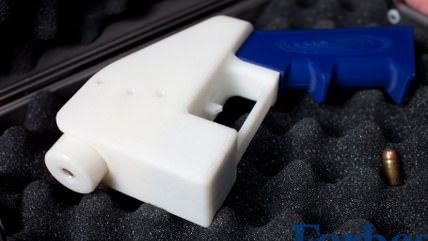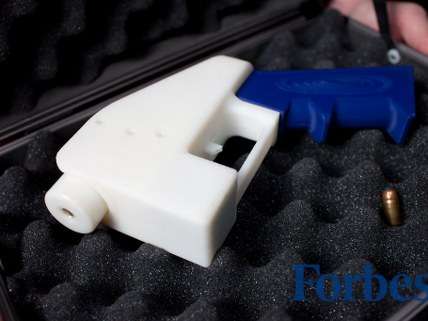3D-Printed Handgun Prompts Congressman To Propose Impotent Legislation


After Forbes's Andy Greenberg broke the news that Cody Wilson and Defense Distributed have successfully created a (apparently) working gun with a 3D printer, Rep. Steve Israel, who has been warning of doom, doom!, should this day come, quickly issued a press release calling for new laws to head off the menace of DIY weaponry. Israel's objection is, allegedly, that Wilson's 3D-printed gun is made of ABS plastic, and therefore invisible to metal detectors (Wilson built a hunk of metal into his gun to address this concern, but it could easily be left out). It's hard to believe, though, that the congressman would be thrilled if Wilson had printed his pistol out of metal, instead. Not that it matters, though — the legal tweak that Steve Israel proposes is about as enforceable as a ban on photocopying your own ass in your home office.
Writes one of Rep. Israel's loyal minions:
Melville, NY—Today, following news of a working plastic gun made almost entirely on a 3D printer, Congressman Steve Israel (D-Huntington) renewed his call for passage of his recently-introduced Undetectable Firearms Modernization Act that extends the ban on plastic firearms and includes homemade, plastic high-capacity magazines and receivers. The existing ban on plastic guns expires this year and does not clearly cover these major components. On Friday, Defense Distributed, a group of homemade gun enthusiasts, premiered a plastic firearm with only one small necessary metal part, a single nail used as the firing pin.
Rep. Israel said, "Security checkpoints, background checks, and gun regulations will do little good if criminals can print plastic firearms at home and bring those firearms through metal detectors with no one the wiser. When I started talking about the issue of plastic firearms months ago, I was told the idea of a plastic gun is science-fiction. Now that this technology appears to be upon us, we need to act now to extend the ban on plastic firearms."
The Defense Distributed project circumvents the current Undetectable Firearms Act by including an extraneous block of metal in the gun, making the firearm detectable by metal detector. However, those who wish to smuggle guns onto planes and into high security areas will soon be able to download the digital blueprints from Defense Distributed's website and forgo the extraneous metal, producing guns completely undetectable by metal detector.
The revamped Undetectable Firearms Act that Rep. Israel wrote makes it illegal to manufacture, own, transport, buy, or sell any firearm, receiver, or magazine that is homemade and not detectable by metal detector and/or does not present an accurate image when put through an x-ray machine. The reauthorization would extend the life of the bill for another 10 years from the date of enactment.

The legislation (PDF) that Rep. Israel proposes (that's the nervous fellow himself to the right) would establish a "security exemplar" as a standard that all homemade firearms would have to meet. Any weapon less detectable would be illegal. A similar restriction would be extended to homemade ammunition magazines. This piece of legislation doesn't propose to ban DIY manufacturing — just to restrict it to weapons with substantial metal components — but it's hard to see this as anything other than a shot across the bow. A shot from a popgun.
Home manufacturers are the specific target here, since the legislation refers to the alleged threat posed by "computer numerical control mills ('CNC mills'), 3-dimensional printers ('3D printers'), and laser cutting machines" in the hands of "a person who is not a licensed manufacturer." And that's precisely the flaw with the "Undetectable Firearms Modernization Act" — it proposes to tell people what they can make with devices that are sitting in their workshops, out of sight of prying eyes. The bad guys from which the law is supposedly intended to protect us would be inconvenienced only if they actually took their printers to the airport to make their guns at the ticket counter in public view, though the law could effectively prevent harmless people from bringing 3D-printed guns and magazines made of plastic to commercial ranges (thought there's no requirement that ranges purchase magnetometers to test such weapons). What the law absolutely can't do is reach into private spaces to prevent the manufacture of forbidden devices.
I suppose Rep. Israel would argue that there's a symbolic importance to his legislation, to demonstrate the government's firm intention to keep the public safe from … new things? What's really demonstrated by his proposed bill, however, is just how impotent the government is when opposed by newly empowered individuals.


Show Comments (170)